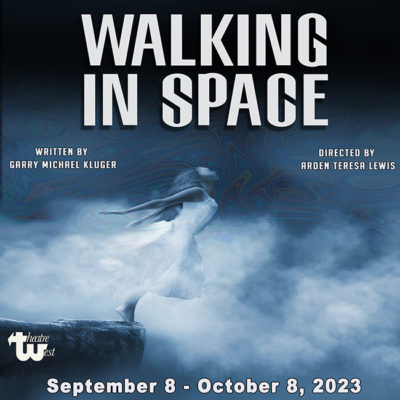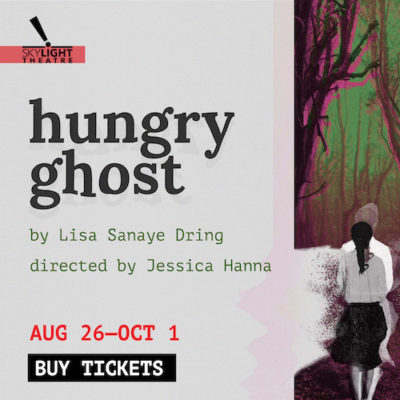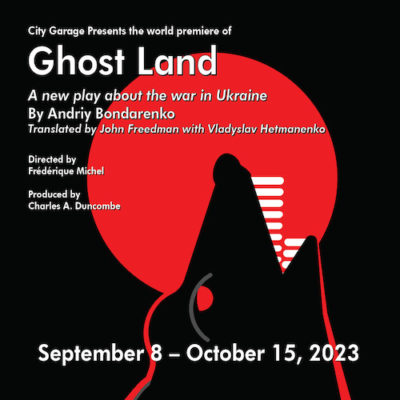
An American in Fiji
Finding Performance Art in the Echoes of Colonialism, in the South Pacific
By Steven Leigh Morris
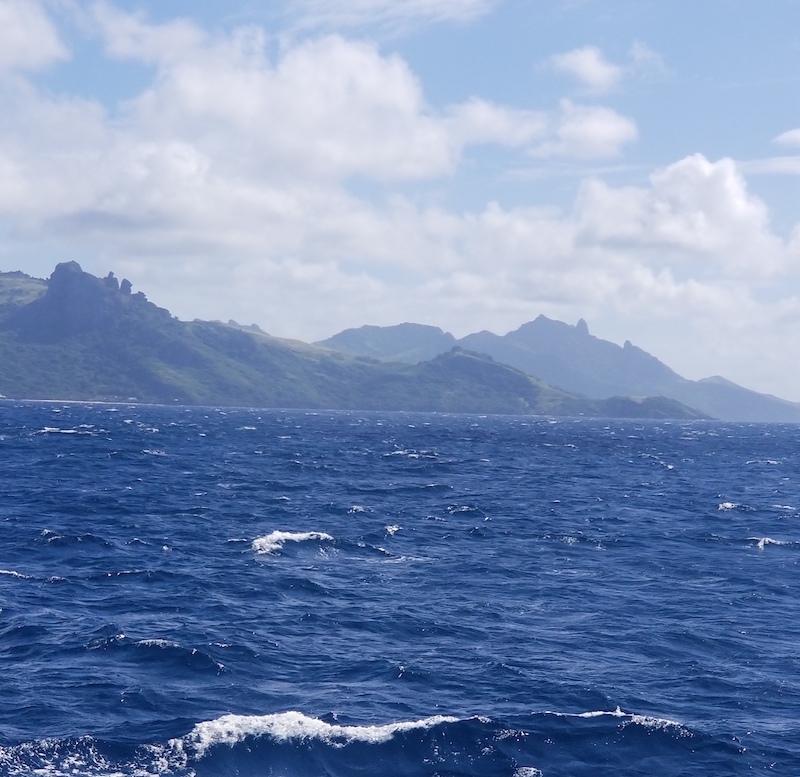
One such fellow, a young man, popped out of the jungle onto the trail, right in front me. He wore a sleeveless T-shirt, jeans, and sandals; a phone charger dangled from his neck like a scarf.
The Dalai Lama said that one should visit a new place at least once a year.
That wasn’t the main reason I found myself on Nanuya Lailai Island last week. It was the incredibly affordable flight/resort package that was offered by Expedia on one and only one day of departure that permitted less than three days to leave the country, and to be hurtled across the International Date Line and below the Equator.
In all my years, I’ve never before crossed the International Date line, nor have I traveled below the Equator.
Nanuya Lailai Island is a truly remote place, a coconut-groved, sugar-caned and jungled pimple of land rising out of the South Pacific. Inland of one beachhead, there’s a sign: “Beware falling coconuts.” And they’re not kidding. This is a jungle where bowling balls fall out of the trees. The island is the one of the northern-most destinations along a string of what’s called the Yasawa Islands off the coast of Fiji, a five-hour ferry ride from the main island’s Denarau port.
Yes, it was wondrous. Yes, it was unsettling.
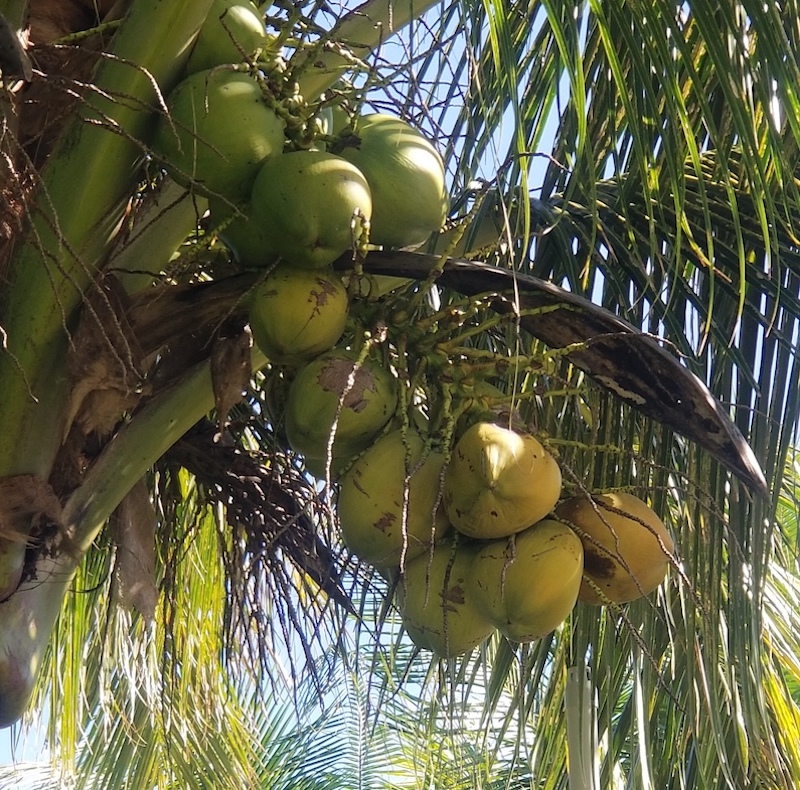
There are no gasoline-powered cars, buses or trucks on this island. The water is about as clear and blue as I’ve seen anywhere, ideal for swimming and snorkeling, though the islands’ fabled coral reefs are disappearing due to rising water temperatures. Late May is winter in Fiji, humid with monsoonal downpours at night, yet there were remarkably few mosquitoes. Most wondrous, for me, was the night sky in the Southern Hemisphere, looking up at constellations I’ve never seen in my life — hidden from us above the Equator. No Big Dipper. No Orion’s Belt. An entirely different set of celestial characters. The sun and the moon were familiar. Other than that, it was like being transported to a different planet.
Sort of.
Hiking along a jungle trail that traverses the island’s mid-section, beyond the resort, I crossed by a few homes of locals, shacks really. Hard to tell if they have running water, though they seem to have electricity. The residents burn their garbage outdoors every day.
In Southern California, such a habit would lead to ecological catastrophe even more dire than the smog we already endure, but these islands are sparsely populated, so the impact is negligible. Physically, the local (indigenous) Fijian’s are dark-skinned with African characteristics.
One such fellow, a young man, popped out of the jungle onto the trail, right in front me. He wore a sleeveless T-shirt, jeans, and sandals; a phone charger dangled from his neck like a scarf. When he saw me, he turned back smiling with “Bula” — an all-purpose Fijian “hello, good morning, good day” greeting. It struck me how the Fijians are preternaturally friendly, but then again, I was a tourist, and tourism is the primary industry there, having superseded the sugar industry. It may simply be a case of, they know where their bread is buttered. I was an intruder on his island. Okay, maybe not an intruder but a guest. Maybe that explains some of the “Bula bula” that comes at you from the locals, even from the ones on speed boats, waving as they see you rowing your kayak out of the shallows.
HISTORY
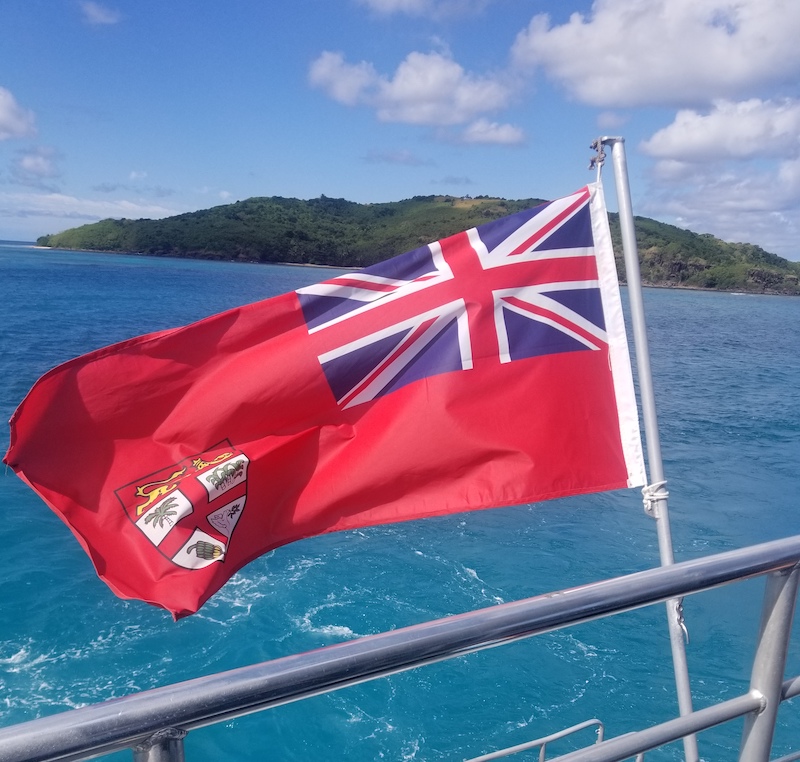
After one or two songs, they disbanded, returning to their assignments cleaning rooms, or checking out boats, or working in the sauna. Even in paradise, a job is a job, repeated every day.
It was hard to discern if the daily “Bula bula” greetings by the resort staff were performative theater. One Israeli guest, despondent over the growing nationalistic and racial superiority complexes in her own country, noted that when the staff in Fiji greet you with that musical embrace, they don’t look you in the eye. She perceived an undertone of weariness and resentment.
They serenade you when you step off the plane into the airport in Nadi. They serenade you when your boat arrives at the dock. They serenade you at meals. They serenade you just before you board the ferry to depart. That’s part of their job. Here, during these songs, I observed they did not look the guests in the eye while they sang. Some sang with enthusiasm. Some less so. After one or two songs, they disbanded, returning to their assignments cleaning rooms, or checking out boats, or working in the sauna. Even in paradise, a job is a job, repeated every day.
As a teenager, I worked in Disneyland for a summer. The Happiest Place on Earth. Paradise. I was a cashier and folded T-shirts in what was then “Character Corner.” We were not allowed to use the word “customer.” The correct term was “guest” as in Fiji. Even as a teenager, with the opportunity of such a performative job, by the end of the summer, I’d had enough. The repetition of it. The theater of it. The role imposed by the tourism industry and enforced by an authoritarian supervisor. It got wearisome, quickly.
History.
Until the late 20th century, Fiji had been a British colony. The flag of Fiji (like the flags of nearby Australia and New Zealand) has the Union Jack tucked into the upper mast corner. In the 19th century, the Brits knew their bread was buttered with sugar, and they needed somebody to harvest the cane. Having learned a bitter lesson from the American colonies at the end of the 18th century, the British also understood that they would be looking into the face of an insurrection, if not a revolution, should they try to enslave the local population to do this work. The British therefore went scouring through the rural, impoverished regions of one of their other colonies, India. They brought in workers, hired at poverty wages (but better than those workers could get at home) with indentured servitude contracts. After five years of service, the imported Indians were free to forge their own lives in Fiji. Which they did. They also intermarried with native Fijians, forming a new ethnicity, the Indo-Fijians, who eventually came to number close to 50% of the population. The Indo-Fijians formed businesses. I saw them running a dock at the Lautoka port on Fiji island. I saw buses zipping with “Kahn Bus Lines” inscribed on the sides. The nationalistic resentment among the indigenous Fijians over the comparative wealth of immigrants’ descendants grew ever more profound. Over the past several decades, bigotry has driven the Indo-Fijians away from the islands. They currently comprise less than 37% of the Fijian population, in what’s reported by The Fiji Times as a brain drain.
Out on Nanuya Lailai Island, I saw no Indo-Fijians, only indigenous residents and workers hired from the local islands. They arrived at their jobs by commuting 7 minutes by boat across the channel from another island, or they walked from their homes along that jungle trail.
PERFORMANCE ART
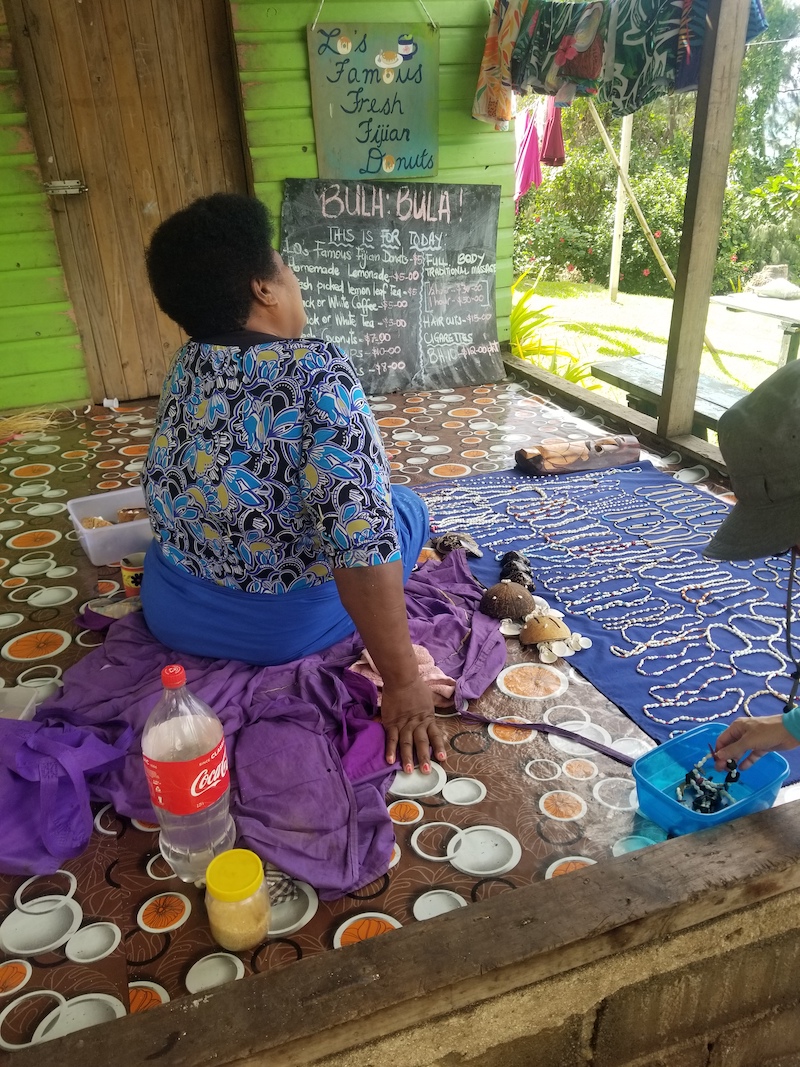
An animated Australian woman, who appeared to be related to the director, came bursting in. “Did you miss me?” she asked a Fijian woman working behind the bar. She then greeted the staff boisterously, with hugs and kisses, and they played along, seemingly pleased, somewhat awkward from not quite knowing the protocol. It was like a scene out of Downton Abbey.
Early one night, I’d gone to bed early. I was awakened by the sounds of an acapella chorus. A pre-planned concert somewhere close. Words in Fijian, but the musical structures and cadences corresponded one-to-one with Anglican hymns, via Baroque cantatas. Each hymn concluded with the Fijian equivalent of an “Amen.” It was as beautiful as it was disturbingly surreal. The musicianship was remarkable. The history unmistakable. The Anglo-European legacy. Echoes of colonialism.
The resort is owned by an Australian couple in their 80s. They live in an expansive home (in stark contrast to the shacks that house all of the natives) above the resort, with its own, large vegetable garden — I spotted cabbages, beets, corn, green mustard, onions, pineapple and bananas from a trail that goes by their estate. Native Fijians were tending this garden.
The Australian resort director is a ruddy-complexioned, silver-haired fellow with a bowling ball stomach, often seen driving an array of electric carts. He grasps a handrail when he climbs two steps. He can be imperious with his workers, though I did see one of the female staff draping her arm affectionately around his neck.
It was nearing dusk the day before I was set to depart, and I was sitting in the outdoor dining area reading Kazuo Ishiguro’s Klara and the Sun, a novel ostensibly about robots programmed to befriend and serve children, but actually about caste systems and the impossibility of love. Both of these themes seemed particularly apt in Fiji, where hierarchy is so unapologetically conspicuous.
An animated Australian woman, who appeared to be related to the director, came bursting in. “Did you miss me?” she asked a Fijian woman working behind the bar. She then greeted the staff boisterously, with hugs and kisses, and they played along, seemingly pleased, somewhat awkward from not quite knowing the protocol. It was like a scene out of Downton Abbey.
A man with a walker and his leg in his cast, whom I surmised was this woman’s husband, sat drinking beers with the resort director. But something was going on. More family arrived: an attractive blonde — perhaps the directors’ granddaughter? — who looked no more than 18, wearing a see-through cotton dress over a bikini, strode in, followed by an amiable, doting young man who appeared to be her boyfriend. (I’d observed him over the course of several days and never heard him speak a word. He was following the young blond, usually at a distance of about five steps, and smiling sheepishly.)
“Chopper’s here!” the director bellowed.
Suddenly, directly over the heads, came the whirring, punctuated blasts of a helicopter that was landing on a hill somewhere nearby. All eyes squinted into the sky. The director and the man with the broken foot were angling towards an electric cart with as much haste as they could muster. Meanwhile, the man’s wife appeared flustered because the two men were leaving to greet whomever had arrived by helicopter and she wanted a drink. By the time she retrieved her cocktail from the bartender, the men were leaving in a cart.
“They left without me!” she exclaimed. They bloody left without me!”
At this time, what I believe was the director’s wife showed up driving a different cart. The younger woman got into that cart. And they drove off together in the direction of the helicopter.
Perhaps two minutes later, both carts returned laden with a couple of suitcases that weren’t there before. An assembly of Fijian workers gathered, facing in the direction of the helicopter. This assembly was now a chorus, singing a traditional song of welcome to the Guest of Honor, who hadn’t yet appeared. The chorus sang in perfect harmony.
From his cart, the director shouted in an Australian brogue to the chorus, now immersed in song: “Yer faycing the wrong way. Yer need to tern . . .”
It was a scene out of one those comedies when the audience is set up to expect a character to arrive through a central door, which all of the actors are facing, and then the character pops in through a side door. This is pretty much what happened.
A stocky, buff White man in sandals, shorts and a polo shirt strode in from the far side of the bar, facing the backs of the chorus who were singing in his honor.
The director was now gesticulating to the chorus to turn around, which they did, breaking from their song to laugh at the rampant absurdity of the entire spectacle.
The director turned in my direction: “These New Zealanders. Owlways maykin trubble!”
“Did he fly by chopper all the way from New Zealand?” I asked.
“Neh, from the ehrport.”
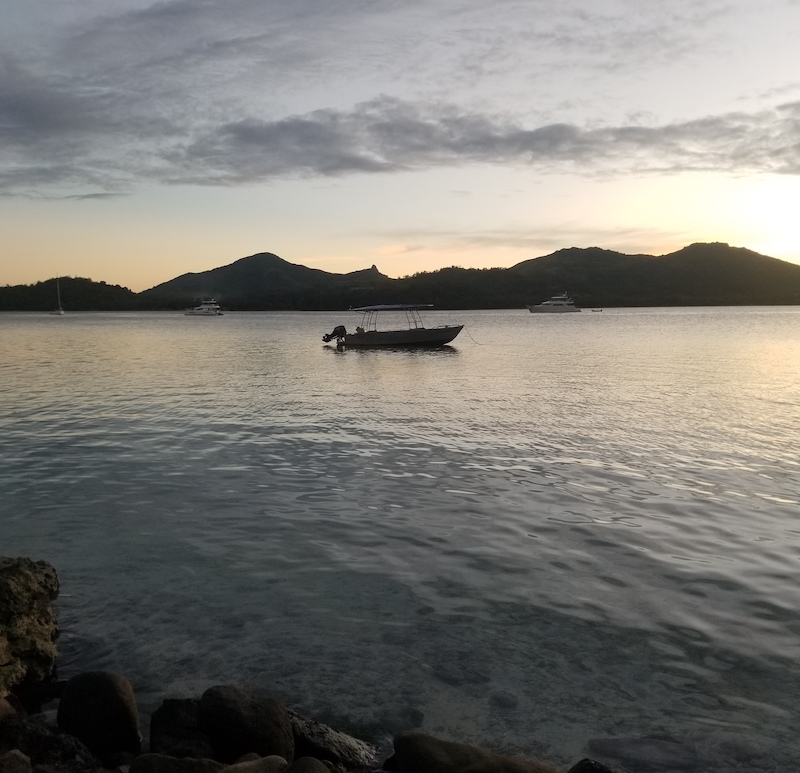
The next morning, the family and friends of the director were gathered at an outdoor breakfast table, and nothing was functioning the way it had been in breakfasts past. The toasters didn’t work. There was no coffee. (“We’re out of beans.”) When I say nothing was functioning, I mean for the resort guests.
Somehow, the director, his family and his friend were being served coffee and pancakes and toast. One of the servers had taken pieces of sliced bread and toasted it for the Guest from New Zealand in some back room in the kitchen. Staff were pretty much ignoring everyone else. The caste system that I’d been reading about in Klara and the Sun was in full force.
As it ever was. On both sides of the Equator and the International Date Line.
It was an odd sensation to land in Los Angeles precisely two hours before I’d departed from Fiji, as though I’d been traveling back in time. Which I had been. In one direction or another.
That line by William Faulkner’s novel, Requium for a Nun, springs to mind: “The past is never dead. It’s not even past.”


